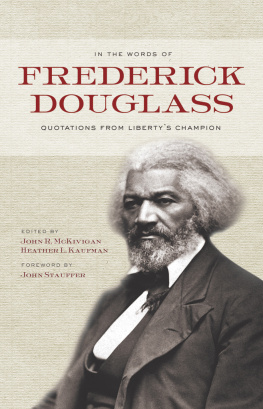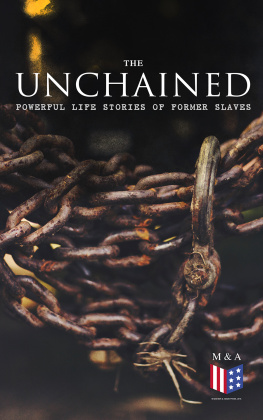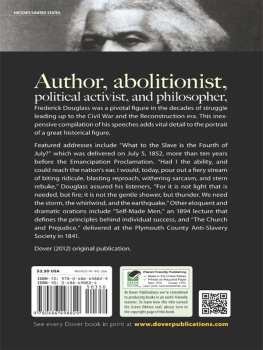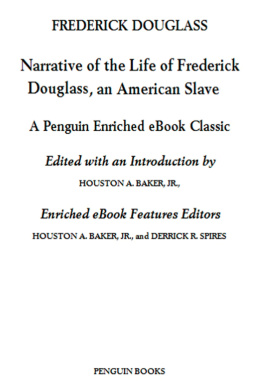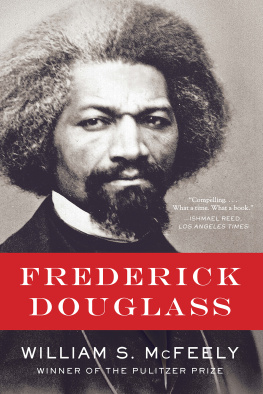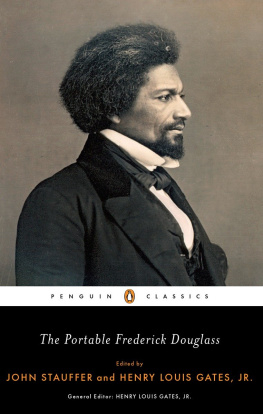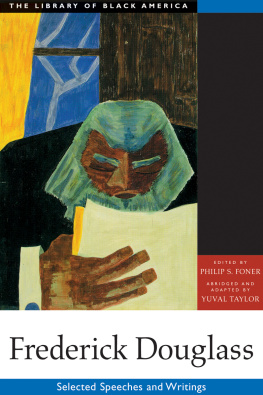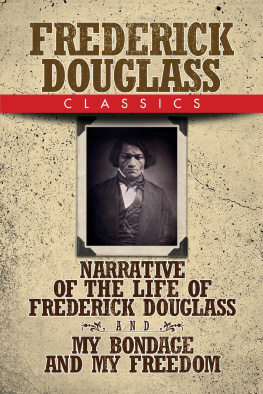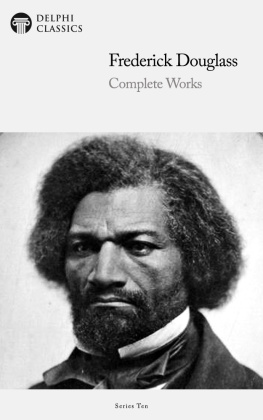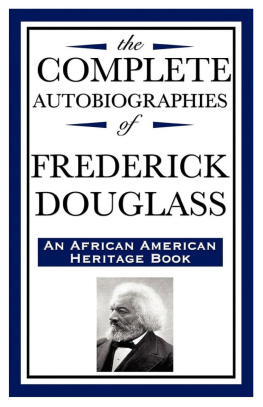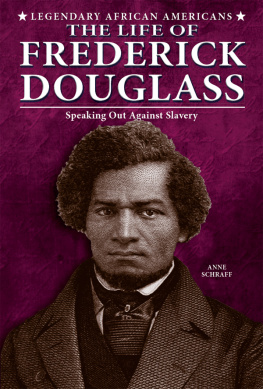Douglass Frederick - In the Words of Frederick Douglass
Here you can read online Douglass Frederick - In the Words of Frederick Douglass full text of the book (entire story) in english for free. Download pdf and epub, get meaning, cover and reviews about this ebook. publisher: Lightning Source Inc. (Tier 3), genre: Science. Description of the work, (preface) as well as reviews are available. Best literature library LitArk.com created for fans of good reading and offers a wide selection of genres:
Romance novel
Science fiction
Adventure
Detective
Science
History
Home and family
Prose
Art
Politics
Computer
Non-fiction
Religion
Business
Children
Humor
Choose a favorite category and find really read worthwhile books. Enjoy immersion in the world of imagination, feel the emotions of the characters or learn something new for yourself, make an fascinating discovery.
- Book:In the Words of Frederick Douglass
- Author:
- Publisher:Lightning Source Inc. (Tier 3)
- Genre:
- Rating:5 / 5
- Favourites:Add to favourites
- Your mark:
- 100
- 1
- 2
- 3
- 4
- 5
In the Words of Frederick Douglass: summary, description and annotation
We offer to read an annotation, description, summary or preface (depends on what the author of the book "In the Words of Frederick Douglass" wrote himself). If you haven't found the necessary information about the book — write in the comments, we will try to find it.
Douglass Frederick: author's other books
Who wrote In the Words of Frederick Douglass? Find out the surname, the name of the author of the book and a list of all author's works by series.
In the Words of Frederick Douglass — read online for free the complete book (whole text) full work
Below is the text of the book, divided by pages. System saving the place of the last page read, allows you to conveniently read the book "In the Words of Frederick Douglass" online for free, without having to search again every time where you left off. Put a bookmark, and you can go to the page where you finished reading at any time.
Font size:
Interval:
Bookmark:

In March 1895, the twenty-seven year-old, newly appointed professor at Wilberforce College in Ohio, W. E. B. DuBois, was invited to address a campus service commemorating the recent death of Frederick Douglass. DuBois had heard Douglass speak only once, but like most African Americans of his generation, he was very familiar with his exploits. He eulogized Douglass as a true statesman, a man who being in a position to lead, leads. DuBois singled out Douglasss accomplishments: a powerful voice for the abolition of slavery, a successful lobbyist for the enlistment of black soldiers in the Civil War, and an uncompromising champion of the enfranchisement and equal rights of the freedmen. DuBois then attempted to define the lessons of that career for future generations: As an advocate of civil rights Frederick Douglass stood outside mere race lines and placed himself upon the broad basis of humanity. In this stand the best thought of the 19th century in all the world is with us; and as long as we keep to this broad principleas long as we condemn lynching men, & not merely condemn lynching Negroes, so long shall we continue slowly but surely to approach the goal which this our Moses placed before us.
Another rising black leader, Booker T. Washington, also attempted to define the lessons of Douglasss life for African Americans
The differing emphases of DuBoiss and Washingtons interpretations of Douglasss historical significance persisted throughout the next century. During the modern civil rights era, a rancorous debate occurred about the relevance of Douglasss example for solving the racial problems of the nation. He was touted as a champion of nonviolent as well as militant protest by such competing spokespersons for the 1960s civil rights movement as James Foreman, Stokely Carmichael, and Angela Davis. Although for decades Douglass had been held up as a symbol of race pride, many black nationalists of that decade faulted his dedication to integration and other radicals branded his faith in individual economic achievement as naive.
In this new century, Douglass remains an enduring political and cultural symbol, but like some other figures of times long passed such as Abraham Lincoln, Thomas Jefferson, George Washington, Susan B. Anthony, John Brown, or even Robert E. Lee, a separation seems to grow inevitably between the iconic figure and his or her actual historical record.editorials, correspondence, and three autobiographies, it seems possible to selectively quote him in support of dozens of contradictory positions. Therefore a brief examination of Douglasss life will be useful to demonstrate that he was a serious thinker, deeply engaged in both the political debates and intellectual currents of his time. Although DuBoiss Douglass did lead, he also observed, analyzed, reflected, and reconsidered his views on multiple issues throughout the nineteenth century. To fully understand Douglasss public statements, it is essential that they be placed within the context his remarkable life story.
Thanks largely to his own autobiographical writings and the dedicated work of his biographers, the details of Frederick Douglasss life are better known than those of any other nineteenth-century African American. He was born on a tobacco plantation on the eastern shore of Maryland and given the name Frederick Augustus Washington Bailey. His mother Harriet was a slave, but his grandmother Betsy Bailey raised him. Soon after Douglasss birth, Harriet was hired out to work on another farm, and she could visit her son only infrequently. Her mother Betsy Bailey was a strong woman, proud of a lineage that she could trace back several generations to a slave Baly, imported from the West Indies but perhaps born in Africa. In her remote cabin, she raised her grandson until the age of six, when she delivered him to the Wye House plantation, the ancestral base of the powerful Lloyd family. Without advanced warning, Betsy left young Frederick at Wye House and never saw him again as a child, thus ending, according to Nathan I. Huggins, Douglass biographer, his only real attachment to family.
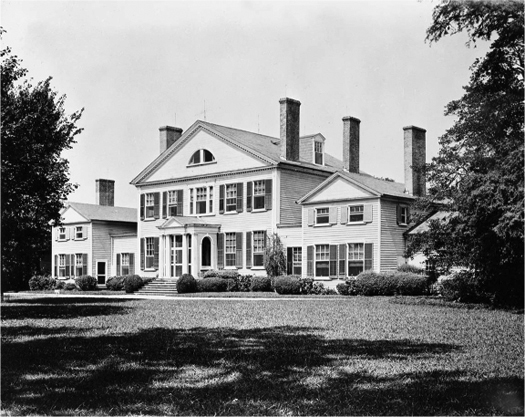
Wye HouseEntrance Front. Z24.565VF. Courtesy of the Maryland Historical Society.
Douglasss owner was Aaron Anthony, the Lloyds principal overseer. Anthony, who some believed was his father, put the boy to work assisting his cook. While still a child, Douglass, hiding in a closet, witnessed Anthony sadistically whip his aunt Hester. He later graphically recounted this and many other inhumane attacks as regular features of slave life on the Lloyd plantation. In contrast, Anthony often indulged young Douglass and allowed him to serve as a companion of one of the Lloyds male children. The two roamed the forests and swamps, with the young Lloyd shooting game and Douglass retrieving it. Through his contact with the Lloyds, Douglass had a glimpse of an affluent lifestyle far beyond the imaginings of most slaves. As a boy, he sat on the banks of the Chesapeake Bay and dreamed of a better life while watching ships sail by on their way to the far corners of the world. In later antislavery speeches and in his autobiographies, Douglass often recounted details of these early experiences. Not only did he describe his own treatment in order to condemn the inherent inhumanity of the institution of slavery, but he also extolled the importance of family relationships that he had known briefly, if at all.
A significant turning point in Douglasss life came in 1826 when Anthony loaned the young slave to his daughters brother-in-law, Hugh Auld. Auld was a Baltimore shipwright who wanted the young slave as companion for his own son, Tommy, and as a helper around the house for his wife, Sophia Auld, who had never before had a slave under her control. According to Dickson Preston, Douglass biographer, she could no more treat him as an inferior than one of her own children. If anything, Aulds opposition encouraged Douglass to become literate. He bribed local school children with sweets stolen from the Aulds kitchen to continue his education until he had mastered reading.
At some point in his Baltimore youth, Douglass acquired a copy of Caleb Binghams textbook on English grammar and rhetoric, the Columbia Orator, first published in 1797. This work contained excerpts from speeches by such famous orators as Cicero, William Pitt, and Charles James Fox. Not only did these mens words serve as models that inspired the young Douglass to enter public life, but also an essay on oratorical skills added by Bingham influenced his later speaking style. William McFeely, Douglass biographer, has observed Much of the striving for eloquent expression that marked Douglasss speeches can be traced to his absorption of Binghams lessons.
By 1833, Aaron Anthony had died and Douglass became the property of Anthonys son-in-law, Thomas Auld, a storekeeper in the small village of St. Michaels, back on the Maryland eastern shore. After a quarrel between the Auld brothers, Thomas Auld had the fifteen-year-old slave returned to him at St. Michaels. Douglass found the routines of village life boring after having lived in Baltimore. He got into serious trouble for attempting to operate a clandestine Sunday school for local blacks. To instill more discipline in this overindulged slave, Auld hired out Douglass to work for a year on the farm of the most notorious slave breaker in the area, Edward Covey. Determined to make him a more pliant slave, Covey underfed and overworked the young man. Escalating tensions between the two culminated in a brutal two-hour-long showdown in August 1834 in which Douglass successfully resisted all attempts by Covey to tie and whip him. Douglass later recalled,
Font size:
Interval:
Bookmark:
Similar books «In the Words of Frederick Douglass»
Look at similar books to In the Words of Frederick Douglass. We have selected literature similar in name and meaning in the hope of providing readers with more options to find new, interesting, not yet read works.
Discussion, reviews of the book In the Words of Frederick Douglass and just readers' own opinions. Leave your comments, write what you think about the work, its meaning or the main characters. Specify what exactly you liked and what you didn't like, and why you think so.

